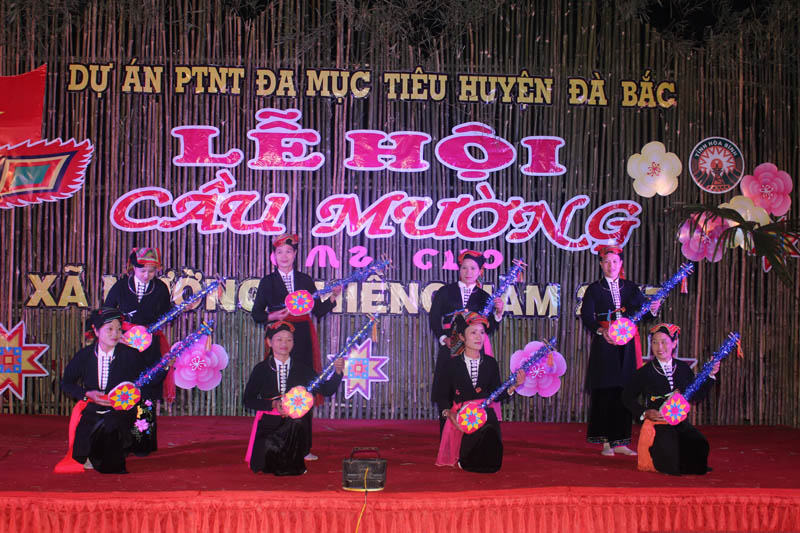
(HBO) – The mass art movement in Muong Chieng commune (Da Bac district, Hoa Binh province) has developed over the past time with the engagement of numerous people, creating an exciting atmosphere in production and improving locals’ spiritual and cultural lives. Art performances have played an important role in promoting local traditional cultural values.
Chairman of the communal People’s Committee Sa Van Hung said with over
90 percent of population being
Tay ethnic
people, the public art activities have received much attention from the local
Party committee, authorities and mass organisations. At present, in additional
to a commune’s art troupe, nine hamlets in the commune have set up art troupes.
Each has 10-15 members. Mass organisations such as youth, women and elder
people unions also established performance teams.
Art troupe
in Muong Chieng commune (Da Bac) usually perform to serve people.
To develop the public art movement, the communal
Party and People’s Committee have mobilised sources to upgrade and build
cultural houses to meet the local demand of performing arts and practicing
sports.
The commune hosts a number of exchanges,
competitions and festivals during special occasions such as Tet holiday,
attracting crowds of people. The quality of art programmes has been improved,
creating a cheerful atmosphere for local residents. The locals are encouraged
to join these activities to enrich their cultural and spiritual lives as well
as contribute to preserving cultural identities. Most of art troupes perform
voluntarily while actively involving in the dissemination of the Party’s
guidelines and the State’s policies and law.
Present at an art exchange night in Muong Chieng
commune, we felt the strong development of the public art movement here. The
event became a festival of local people with nearly 20 music, dance and
instrument performances, including folk songs and ethnic dances praising the
Party, late President Ho Chi Minh, and the nation’s heroic struggle.
At the end of the event, people held each
other’s hands to a dance to affirm their solidarity.
Sa Thi Thuong from class 11A4, Muong Chieng high
school boarding school said she felt very happy to practise songs and dances as
well as exchange with many people to preserve and develop local culture./.
Phong Phu commune, Tan Lac district of Hoa Binh province, is widely regarded as the cultural heartland of the Muong ethnic group. Among its many traditional communities, Luy Ai hamlet (formerly Ai hamlet) stands out as a rare location where the customs and way of life of the Muong Bi people remain largely intact.
The Truong Kha temple festival, a distinctive cultural event held every three years in Vu Ban township, Lac Son district, returned recently with vibrant rituals and folk traditions of the Muong people. Located next to the Buoi River in the Muong Trao fields, the Truong Kha Temple is dedicated to the three Kun Dol deities, revered for teaching farming techniques, irrigation, weaving, and protecting the harvest.
The demand for spaces serving community activities of residents in various areas across Hoa Binh city has been satisfied as local cultural houses now feature modern, spacious facilities thanks to the effective implementation of Resolution No. 49/NQ-HDND issued on December 28, 2021 by the city People's Council, which approved the plan for reorganising, converting, and allocating land for the construction, repair, and expansion of cultural houses in Hoa Binh’s villages and residential areas until 2025.
At the end of May, the Hoa Binh Provincial Ethnic Arts Troupe organized a series of performances for residents in Region 2 and Region 3 communes across the province. Bringing art to ethnic communities in remote, isolated, and especially disadvantaged areas has become a meaningful activity. These are not merely artistic performances but also journeys to disseminate cultural values, enrich spiritual life, and contribute to preserving the cultural identity of ethnic minorities.



